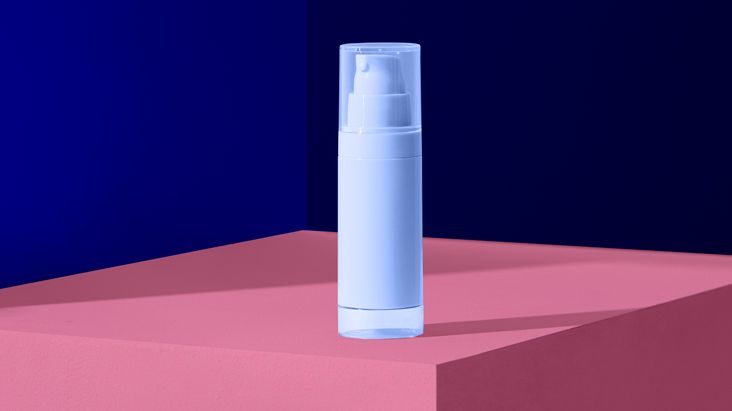Beauty bloggers across the globe rave about it and products containing it are showing up on shelves in greater numbers — but why? Turns out, this all-star ingredient does a lot of heavy lifting for folks with sensitive skin or people who just want silky smooth skin in general *raises hand.*
That’s why we put together a guide explaining this trendy skin care ingredient, what it does, where to find it, and how you can add it to your skin care routine. Let’s begin.

Allantoin, aka aluminum dihydroxy allantoinate, is a naturally derived additive found in tons of over-the-counter (OTC) skin care products. It can be extracted from plants like:
- beets
- comfrey
- chamomile
- wheat sprouts
- tobacco seed
But most of the time, allantoin is created in a lab from urea or glyoxylic acid — two compounds found in animal urine. 😬 Despite its kinda gross origins, it’s seriously useful when it comes to skin care.
Allantoin is similar to skin care ingredients like glycerin and vitamin E because it’s a common and versatile ingredient. In fact, you’ve prob used it without even realizing it.
Allantoin might be your ticket to baby-butt smooth skin. It’s one of those amazing ingredients that offers a major bang for your buck. It’s extra great if you’re dealing with:
- dryness
- dullness
- irritation
- acne scars
- cuts and scrapes
Here are the deets on how allantoin can do your dermis good.
Moisturize me
Allantoin is known for its ability to add more water to your skin. It can also help your skin hang on to moisture longer. This helps fight annoying skin issues like dryness, itching, and irritation, which can lead to more skin probs like acne.
See ya l8r, scaly skin
Allantoin has killer keratolyic properties. That means it sloughs away old, dead skin cells. This spurs the growth of fresh, healthy new ones. That’s a good thing for anyone looking to improve their skin texture. It may also help rid you of bumpy skin and callouses.
So long, scars
Nasty cut or scrape? Or maybe you’re trying to slay your acne scars once and for all. Either way, allantoin can help! Its tissue-repairing properties can:
- increase blood flow
- encourage the growth of new blood vessels
- stimulate the growth of skin proteins like collagen
- double the effects when combined with scar gel or silicone-based products
So basically, allantoin may help your skin heal faster. It might even diminish the appearance of scars or prevent a new scar from forming.
Ditch the dullness
Dead skin cells = major dullness. Allantoin can give your face a fresh start. It’s a top-notch exfoliator that’ll kick those dead cells to the curb. This promotes brighter, glowing skin.
Reduce signs of skin aging
Aging skin is prone to dryness and slower cell turnover. This can lead to tightness and dullness. But allantoin is like a triple whammy for smooth, supple skin. It moisturizes, exfoliates, and promotes collagen production.
Pure allantoin powder is possible to track down. But you’re better off sticking to a lower percentage unless your dermatologist says otherwise. Most allantoin OTC products have a concentration of 2% to 5%.
Pick your products
You can find allantoin all over. It’s commonly found in:
- anti-scar gels
- anti-acne products
- lipstick and chapstick
- wound healing ointments
- sun care products like sunscreen
- shampoos made for scalp issues like flaking or dandruff
- OTC moisturizers, especially ones designed to fight extreme roughness or flakiness
Allantoin is nontoxic and doesn’t build up in the body even with frequent use. Plus it shows up in about 1,300 skin care products. You know it’s gotta be pretty darn safe considering how popular it is. Still, there are some things to look out for.
Keep those peepers safe
Like all skin products, allantoin should only be used on the skin. It can be super irritating if it gets in your eyes. Do an eye flush with cool water for relief if you do have a mishap. 👀
Allergies
Allantoin allergies are rare. But it can happen. Like with many skin care ingredients, there’s always the potential for a surprise reaction.
Signs of an allergic reaction
Some contact dermatitis red flags include:
- itching
- redness or discoloration
- burning
- stinging
- irritation
FYI: You might wanna steer clear of allantoin if you’re allergic to comfrey. Some allantoin products are derived from this herb.
If you suspect an allergic reaction, stop using your allantoin products. But keep in mind, allantoin is used in a lot of things. So, your allergy might not be from allantoin.
Allantoin is a super common moisturizing and exfoliating ingredient. It’s perfectly safe when used at lower concentrations. It can keep skin hydrated, promote smoothness, fight dullness, and help wounds heal faster. Give it a go for a healthy glow.

